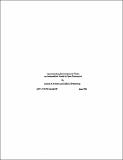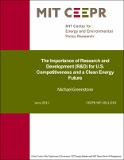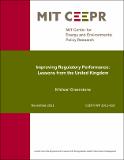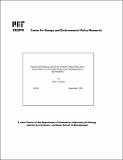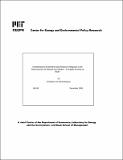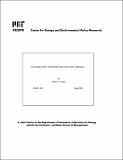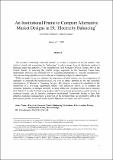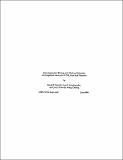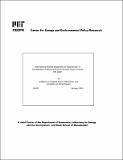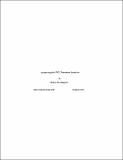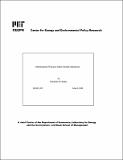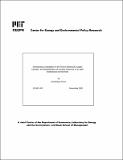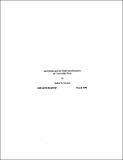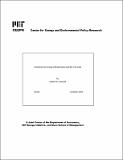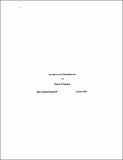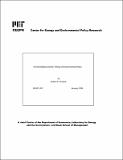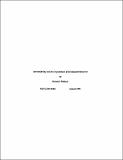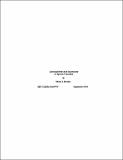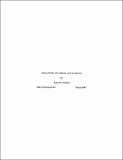Browsing Center for Energy and Environmental Policy Research by Title
Now showing items 142-161 of 334
-
Implementing environmental taxes on intemediate goods in open economies
(MIT Center for Energy and Environmental Policy Research, 1994)Many proposed and actual environmental taxes are taxes on intermediate goods. These goods, such as fossil fuels, are typically tradable, and they are also used in the production of many tradable final goods. How should ... -
The Importance of Research and Development (R&D) for U.S. Competitiveness and a Clean Energy Future
(MIT Center for Energy and Environmental Policy Research, 2011-06) -
Improving Regulatory Performance: Lessons from the United Kingdom
(MIT Center for Energy and Environmental Policy Research, 2011-11) -
Incentive regulation in theory and practice : electricity distribution and transmission networks
(MIT Center for Energy and Environmental Policy Research, 2005)Modern theoretical principles to govern the design of incentive regulation mechanisms are reviewed and discussed. General issues associated with applying these principles in practice are identified. Examples of the actual ... -
Infrastructure investments and resource adequacy in the restructured US natural gas market : is supply security at risk?
(MIT Center for Energy and Environmental Policy Research, 2006)The objective of this paper is to analyze the development of US natural gas infrastructure over the last two decades and to discuss its perspectives. In particular, we focus on the relationship between the regulatory ... -
Inscrutable OPEC? : behavioral tests of the cartel hypothesis
(MIT Center for Energy and Environmental Policy Research, 2003)We show that standard statistical tests of OPEC behavior have very low power across a wide range of alternative hypotheses regarding market structure. Consequently, it is difficult, given the current availability and ... -
An institutional frame to compare alternative market designs in EU electricity balancing
(MIT Center for Energy and Environmental Policy Research, 2007)The so-called "electricity wholesale market" is, in fact, a sequence of several markets. The chain is closed with a provision for "balancing," in which energy from all wholesale markets is balanced under the authority of ... -
Interdependent pricing and markup behavior : an empirical analysis of GM, Ford and Chrysler
(MIT Center for Energy and Environmental Policy Research, 1990)In this paper we show how to adapt the traditional contingent claims valuation techniques to correctly value the firm and its liabilities in the presence of agency costs. This enables us to measure the significance of the ... -
International market integration for natural gas? : a cointegration analysis of priced in Europe, North America and Japan
(MIT Center for Energy and Environmental Policy Research, 2004)We examine the degree of natural gas market integration in Europe, North America and Japan, between the mid 1990₂s and 2002. Our hypothesis is that there was a certain split of prices between Europe and North America. The ... -
Interpreting the IPCC emisions scenarios
(MIT Center for Energy and Environmental Policy Research, 1992)This paper discusses how two sets of emissions scenarios, generated using the Atmospheric Stabilization Framework, were used by the United Nations Intergovernmental Panel on Climate Change (IPCC). In particular it discusses ... -
Intertemporal pricing of sulfur dioxide allowances
(MIT Center for Energy and Environmental Policy Research, 1998)The Clean Air Act Amendments of 1990 initiated the first large-scale use of the tradable permit approach to pollution control. The theoretical case for this approach rests on the assumption of an efficient market for ... -
Introducing competition in the French electricity supply industry : the destabilisation of a public hierarchy in an open institutional environment
(MIT Center for Energy and Environmental Policy Research, 2002)The introduction of market rules in a electricity supply industry characterized by a vertically integrated monopoly and public ownership is not inherently doomed to failure if characteristics of the reform or other elements ... -
Inventories and the short-run dynamics of commodity prices
(MIT Center for Energy and Environmental Policy Research, 1990)I examine the behavior of inventories and their role in the short-run dynamics of commodity production and price. Competitive producers of a storable commodity react to price changes by balancing costs of changing production ... -
Investment in Energy Infrastructure and the Tax Code
(MIT Center for Energy and Environmental Research Policy, 2009-10)Federal tax policy provides a broad array of incentives for energy investment. I review those policies and construct estimates of marginal effective tax rates for different energy capital investments as of 2007. Effective ... -
Investments of uncertain cost
(MIT Center for Energy and Environmental Policy Research, 1992)I study irreversible investment decisions when projects take time to complete, and are subject to two types of uncertainty over the cost of completion. The first is technical uncertainty, i.e., uncertainty over the amount ... -
Irreversibilities and the timing of environmental policy
(MIT Center for Energy and Environmental Policy Research, 1999)The Standard framework in which economists evaluate environmental policies is cost-benefit analysis, so policy debates usually focus on the expected flows of costs and benefits, or on the choice of discount rate. But this ... -
Irreversibility and the explanation of investment behavior
(MIT Center for Energy and Environmental Policy Research, 1990)The explanation of aggregate and sectoral investment behavior has been one of the less successful endeavors in empirical economics. Existing econometric models have had little success in explaining or predicting investment ... -
Irreversibility and uncertainty in species valuation
(MIT Center for Energy and Environmental Policy Research, 1994)This paper incorporates an option value into deforestation policy analysis. Similar to an option value in finance, the option value here reflects the advantage to delaying irreversible species extinction until more information ... -
Irreversibility, uncertainty and investment
(MIT Center for Energy and Environmental Policy Research, 1990)Most investment expenditures have two important characteristics. First, they are largely irreversible; the firm cannot disinvest, so the expenditures are sunk costs. Second, they can be delayed, allowing ... -
Is the gasoline tax regressive?
(MIT Center for Energy and Environmental Policy Research, 1990)Claims of the regressivity of gasoline taxes typically rely on annual surveys of consumer income and expenditures which show that gasoline expenditures are a larger fraction of income for very low income households than ...

